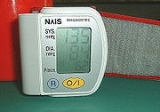
Blood pressure
Overview
Blood pressure is the pressure
exerted by circulating blood
upon the walls of blood vessel
s, and is one of the principal vital signs
. When used without further specification, "blood pressure" usually refers to the arterial pressure of the systemic circulation
. During each heartbeat, BP varies between a maximum (systolic
) and a minimum (diastolic) pressure. The mean BP, due to pumping by the heart and resistance to flow in blood vessels, decreases as the circulating blood
moves away from the heart
through arteries
.
Pressure
Pressure is the force per unit area applied in a direction perpendicular to the surface of an object. Gauge pressure is the pressure relative to the local atmospheric or ambient pressure.- Definition :...
exerted by circulating blood
Blood
Blood is a specialized bodily fluid in animals that delivers necessary substances such as nutrients and oxygen to the cells and transports metabolic waste products away from those same cells....
upon the walls of blood vessel
Blood vessel
The blood vessels are the part of the circulatory system that transports blood throughout the body. There are three major types of blood vessels: the arteries, which carry the blood away from the heart; the capillaries, which enable the actual exchange of water and chemicals between the blood and...
s, and is one of the principal vital signs
Vital signs
Vital signs are measures of various physiological statistics, often taken by health professionals, in order to assess the most basic body functions. Vital signs are an essential part of a case presentation. The act of taking vital signs normally entails recording body temperature, pulse rate ,...
. When used without further specification, "blood pressure" usually refers to the arterial pressure of the systemic circulation
Systemic circulation
Systemic circulation is the part of the cardiovascular system which carries oxygenated blood away from the heart to the body, and returns deoxygenated blood back to the heart. This physiologic theory of circulation was first described by William Harvey...
. During each heartbeat, BP varies between a maximum (systolic
Systole (medicine)
Systole is the contraction of the heart. Used alone, it usually means the contraction of the left ventricle.In all mammals, the heart has 4 chambers. The left and right ventricles pump together. The atria and ventricles pump in sequence...
) and a minimum (diastolic) pressure. The mean BP, due to pumping by the heart and resistance to flow in blood vessels, decreases as the circulating blood
Circulatory system
The circulatory system is an organ system that passes nutrients , gases, hormones, blood cells, etc...
moves away from the heart
Heart
The heart is a myogenic muscular organ found in all animals with a circulatory system , that is responsible for pumping blood throughout the blood vessels by repeated, rhythmic contractions...
through arteries
Artery
Arteries are blood vessels that carry blood away from the heart. This blood is normally oxygenated, exceptions made for the pulmonary and umbilical arteries....
.
Unanswered Questions

